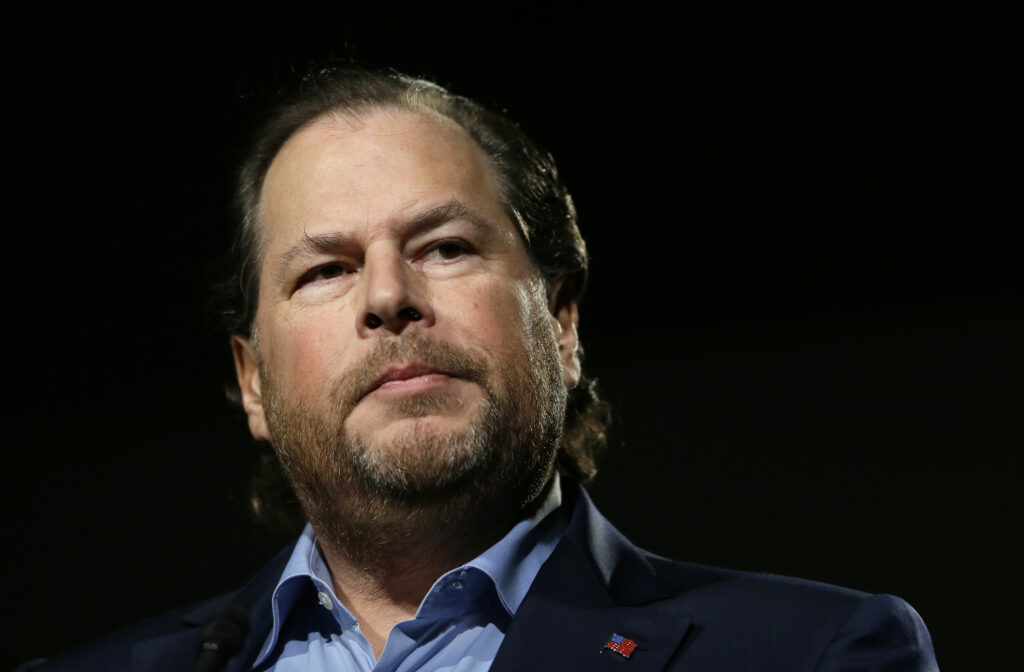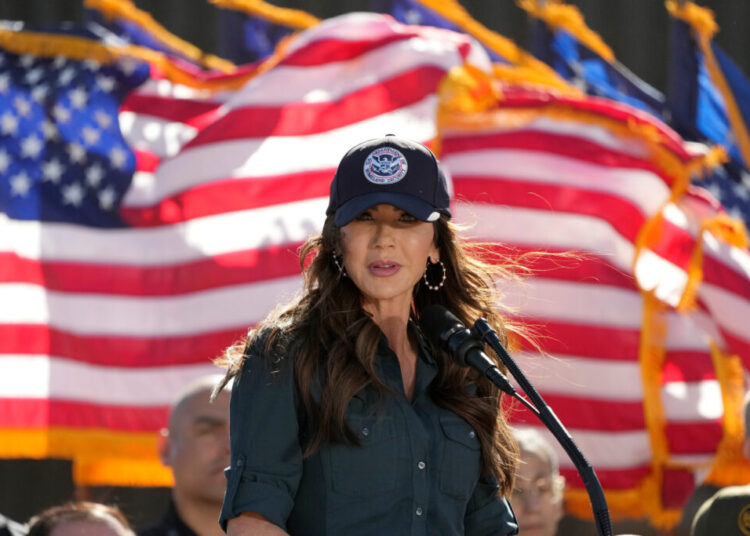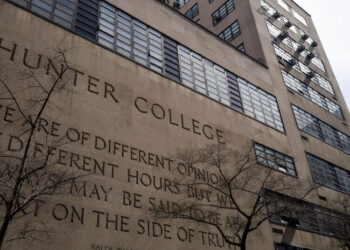SAN FRANCISCO — While tech moguls like Meta CEO Mark Zuckerberg sat center stage at President Donald Trump’s January inauguration, Marc Benioff, CEO of cloud software company Salesforce, was 4,000 miles away at the World Economic Forum in Davos, Switzerland.
Benioff, an influential philanthropist and political voice in San Francisco, appeared set on making clear he wasn’t moving toward Trump. He said at one Davos event that the new administration would not change his or Salesforce’s core values, which include equality and sustainability. “Presidents change. Administrations change. We don’t change,” Benioff said in an onstage interview at a slick event space hosted by Axios, according to video of the event.
But last month, many of Benioff’s onetime fans in San Francisco’s liberal community attacked him after he endorsed Trump’s proposal to send the National Guard into San Francisco to fight crime. “We don’t have enough cops, so if they can be cops, I’m all for it,” he said in an interview with the New York Times.
Rafael Mandelman, president of the city’s Board of Supervisors, called Benioff’s National Guard comments a “gut punch.” San Francisco’s mayor, sheriff and district attorney all pushed back on the idea that federal troops could help the city. Nearly 200 Salesforce employees reacted with barfing-face emojis in an internal message channel after a worker posted the New York Times article that reported Benioff’s comments, according to screenshots viewed by The Washington Post. “This seems to conflict pretty heavily with our values,” one worker wrote.
Tech workers broadly lean Democratic and many CEOs now cultivating friendlier relations with Trump have previously supported liberal causes. But Benioff has made issues such as homelessness relief and LGBTQ+ rights, and the liberal bastion of San Francisco, part of his personal and professional brand.
The recent blowback to Benioff shows the challenges corporate leaders face as they wrestle with the political and cultural collisions of this era — when both the White House and local officials are willing to go after, or even punish, companies they don’t agree with. Some tech companies have donated millions to Trump’s new White House ballroom, but Benioff’s roots in liberal San Francisco turned his brief comments into a major controversy that could have enduring consequences. Salesforce did not donate to the ballroom or Trump’s 2025 inauguration.
Benioff retracted his comments a week after making them and joined other tech figures who helped persuade Trump to hold off a federal surge into San Francisco. But some local leaders aren’t ready to move on. The billionaire’s comments inspired city supervisor Connie Chan and three fellow supervisors to propose a tax on highly paid executives in San Francisco, she said. The measure would “make sure that they pay their fair share for a city that is facing so many challenges and that has to really step up when the federal government fails us,” Chan said.
For San Francisco’s Democratic political establishment, the Benioff drama is a reminder of the city’s vulnerability in Trump’s second term. Democratic state and local leaders across D.C., Illinois, Oregon and California have struggled to push back on the Trump administration’s deployments of National Guard or federal immigration officers.
The proposed tax on executives is likely set to reawaken long-standing tensions between San Francisco’s status as a tech industry hub and a center for liberal politics. Some tech companies moved out of town after the 2018 introduction of a new business tax to fund work on homelessness that was supported by Benioff but opposed by many tech leaders. Mayor Daniel Lurie (D) has signed up tech CEOs as close advisers on his plans to clean up downtown San Francisco, and could face pressure to oppose the new tax proposal. His office declined to comment.
“Marc Benioff stood out as someone who showed us that San Francisco values and the tech industry could coexist with and amplify each other,” a persona that is now “unrecognizable,” said Matt Haney, who represents San Francisco in the California State Assembly and previously served as a city supervisor.
He said many San Franciscans probably hadn’t noticed signs that the billionaire, a registered independent who previously hosted fundraisers for Barack Obama and Hillary Clinton, might be out of touch with local residents and political leaders.
Clinton said she met Benioff through a shared interest in philanthropy and children’s health in a statement to The Post. “While we should hold people to account for what they say and do, we should do it with a full picture of their efforts,” she said. “Particularly when they have done as much as Marc has for people in his community and beyond.” Clinton said he had pioneered changes to corporate philanthropy and work on equal pay.
Benioff, who has given hundreds of millions of dollars to San Francisco causes, has been vocal about his dissatisfaction with the city’s long-standing challenges with drugs and homelessness in recent years. He has repeatedly congratulated Trump since his reelection in social media posts marking his appearances on the cover of Time magazine, which is owned by the tech CEO. Benioff said when he bought the title in 2018 that he would cease political giving and protect its editorial independence.
Benioff didn’t join a White House dinner with tech CEOs that Trump hosted in September but did join the president two weeks later at the British state banquet thrown in the president’s honor.
Salesforce has major business with the U.S. government. In September, Benioff said on a Salesforce earnings call that the U.S. government is the company’s “largest and most important customer … a multibillion-dollar customer.” Soon after, he launched a new division called Missionforce to pursue federal contracts like the $100 million U.S. Army deal Salesforce won in July.
Salesforce declined to make Benioff available for an interview. But he said in a post on X, which he later posted internally for the company’s 76,000 employees, that he remains committed to San Francisco. The following week, he joined Trump at a dinner with business leaders in Tokyo.
Trump warmly acknowledged the billionaire in after-dinner remarks, inviting Benioff to recommend who should be the next chair of the Federal Reserve. “Marc, do you have a suggestion?” Trump said. “You put me on the cover of Time magazine. That was a nice picture. Thank you very much for that.”
Benioff, a fourth-generation San Franciscan, was born into a family that provided early role models of entrepreneurship and charity.
He grew up helping his father Russell run a chain of Bay Area apparel stores on weekends. In his 2019 autobiography “Trailblazer,” Benioff described spending summers visiting the San Francisco office of his grandfather Marvin Lewis, a lawyer and local politician, who would sometimes offer $20 bills to homeless people on Market Street.
An avid programmer, Benioff launched his tech career creating video games in his teens and later became the youngest vice president at business software giant Oracle. He launched Salesforce, an Oracle rival, in 1999, betting that in the future software would be accessed over the internet, not on CD-ROMs.
Salesforce went public in 2004, putting Benioff on track to become one of San Francisco’s wealthiest and most influential figures. The company became the city’s largest private employer and Benioff built a reputation for himself and Salesforce as deeply committed to the city, giving to local health care facilities, schools and parks.
Benioff also intervened in politics, often supporting liberal causes. After Indiana in 2015 enacted a “religious freedom” law that would have allowed business owners to refuse to do business with LGBTQ customers, the tech CEO threatened to reduce Salesforce’s investment in the state, prompting other companies to follow.
“As a native San Franciscan, I took the notion of tolerance for granted,” Benioff wrote in his book, where he also said that “Companies, and the people who lead them, can no longer afford to separate business objectives from the social issues surrounding them.” Then-Gov. Mike Pence later revised the law.
A Salesforce spokesperson said the company has relocated over 500 employees globally since 2015 in response to safety concerns due to changing legislation or policies related to discrimination, equal rights or health care access.
Christin Evans, a local business owner and vice chair of San Francisco’s Homelessness Oversight Commission, recalled connecting with Benioff over Twitter one night in 2018. They discussed a city measure that would tax large corporations based in San Francisco to fund homelessness relief.
Benioff and Salesforce ultimately spent $7.9 million to fund its passage over opposition from the local Chamber of Commerce, other tech CEOs and the mayor. While opponents argued the measure would harm the city’s businesses, “Benioff helped us change that narrative,” Evans said.
Streaming news service Cheddar declared Benioff “most woke” business leader that year, an accolade preserved on Salesforce’s website.
More recently, some local political leaders say Benioff was embracing new priorities and voicing new concerns. He moved to Hawaii in 2020 and became more critical of San Francisco’s persistent challenges with homelessness and drug use. In 2023, he threatened to move Salesforce’s annual Dreamforce conference out of the city, though ultimately did not.
After Benioff posted on X to apologize for his National Guard comments, one local journalist replied with photos appearing to show homeless people in downtown San Francisco. The billionaire responded with a chart suggesting the number of police officers in San Francisco was now roughly 20 percent lower than in 2019. “We have to get back to those … levels,” he wrote.
Benioff is not done with San Francisco. A person familiar with the CEO’s dealings said he remains in regular touch with city leaders. At an appearance with local law enforcement officials last month, Lurie told reporters he’d expressed to Benioff that “public safety is our number-one priority” and that the city has been working “relentlessly” to reduce crime and boost the ranks of local law enforcement. According to data from the San Francisco Police Department, downtown crime has dropped nearly 40 percent this year compared to 2024.
Last month the billionaire and his wife, Lynne, announced a $100 million gift to UCSF Benioff Children’s Hospitals, and Salesforce gave $39 million to public schools, education nonprofits and local hospitals. The Benioffs and Salesforce have now given more than $1 billion to Bay Area causes, according to a company news release.
University of California at San Francisco Chancellor Sam Hawgood said in a phone interview that the CEO’s financial support for UCSF hospitals and medical research has been “transformative.”
“The San Francisco Bay Area is the AI capital of the world,” Benioff said in a press statement, in a nod to his current business priority. “With that leadership comes a responsibility not only to innovate, but to secure the future of our community — ensuring that every child has access to world-class healthcare, safe and welcoming public parks and spaces, and a great education to flourish in the AI era.”
Aaron Horvath, founder and director of the Project on Private Wealth and Democracy, a think tank in Oakland, said in a phone interview that part of the sting in Benioff’s comments stemmed from how the Hawaii resident “still has more political influence than any voter in San Francisco.”
“We should be really careful when we’re anointing the super-rich as civic heroes because we don’t have any power over them,” Horvath said. The power that allows them to bring change many see as positive, he added, is “the same power that permits them to do something destructive and antisocial.”
Lurie has moved to have more tech CEOs closely involved in shaping San Francisco, making working with the business world to boost the local economy a focus of his term since his election last year.
Early this month Lurie shared a video of himself with the district attorney and a handful of San Francisco police officers, calling for more people to join the department. “We need more of you,” Lurie said.
SFPD recently received $1 million to go toward recruitment. It was a gift from Benioff.
The post How a tech billionaire philanthropist got caught between Trump and San Francisco
appeared first on Washington Post.




